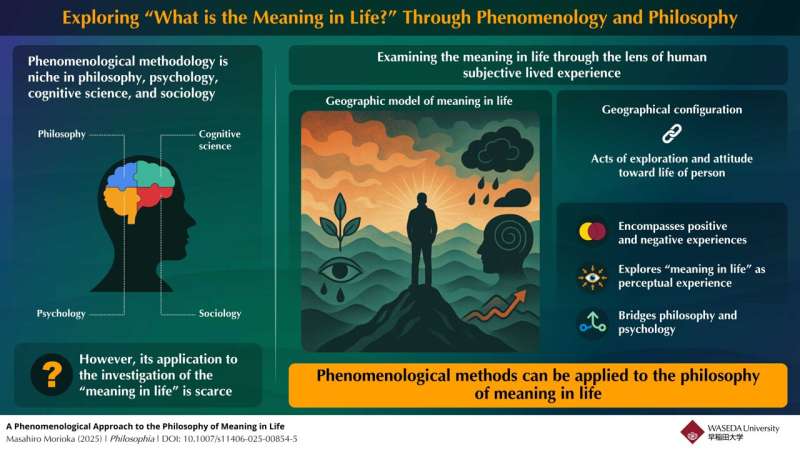Science
New Study Unveils Unique Geographic Model of Life’s Meaning

Psychological and philosophical research has increasingly highlighted the significant role that personal moods and emotions play in shaping an individual’s perception of meaning in life. A recent study led by Professor Masahiro Morioka at Waseda University offers a novel perspective by introducing a “Geographic Model of Meaning in Life.” This model not only seeks to redefine the understanding of life’s meaning but also aims to bridge the gap between philosophy and psychology.
The study, published in the journal Philosophia on June 4, 2025, builds upon the work of philosopher Matthew Ratcliffe, who emphasized how mood influences perception. Morioka’s research extends this idea to explore how individuals relate to their life experiences. Instead of merely categorizing life’s meaning as subjective or objective, this study examines the dynamic relationship between a person’s lived experiences and their pursuit of meaning.
Understanding the Geographic Model
Morioka’s Geographic Model proposes that meaning in life is not static but rather emerges through active exploration and engagement with one’s circumstances. The way individuals approach their lives—marked by various attitudes and commitments—elicits different responses from life itself. These responses manifest as either positive or negative experiences that contribute to an individual’s sense of significance or despair.
The model posits that life’s value is akin to a geographical landscape, shaped by how people navigate their experiences. Morioka describes this process with a poignant analogy: “The geographic model of meaning in life is the whole set of patterns of combinations of lived experiences of the worthfulness of living a life that are experienced being activated by my action of probing into my life in the here and now.” This probing, much like a blind person using a cane, can be influenced by various attitudes, such as optimism or reluctance.
A Paradigm Shift in Understanding Meaning
This research signifies a paradigm shift in the philosophical discourse surrounding life’s meaning. By integrating phenomenological methodology, Morioka’s study treats both meaningful and tragic experiences as integral parts of the same experiential landscape. This approach opens avenues for more productive interdisciplinary collaborations between philosophy and psychology.
Current psychological frameworks utilize both quantitative and qualitative methods to gauge individuals’ perceptions of meaningfulness. However, Morioka’s Geographic Model presents a fundamentally different approach, suggesting that life’s meaning is shaped by the active exploration and engagement of individuals rather than fixed scales of measurement.
Looking ahead, Morioka aims to expand his research by integrating this model with other philosophical frameworks, including solipsistic and liberation approaches to meaning. His ultimate goal is to establish a comprehensive and systematic framework within the philosophy of life’s meaning.
This research not only adds depth to the ongoing debate about the nature of meaning in life but also encourages further exploration of how human experiences shape our understanding of existence. As Morioka notes, the journey into the philosophy of life’s meaning is just beginning, and his findings may pave the way for significant advancements in both philosophical and psychological studies.
-

 World2 months ago
World2 months agoCoronation Street’s Shocking Murder Twist Reveals Family Secrets
-

 Entertainment2 months ago
Entertainment2 months agoAndrew Pierce Confirms Departure from ITV’s Good Morning Britain
-

 Health6 months ago
Health6 months agoKatie Price Faces New Health Concerns After Cancer Symptoms Resurface
-

 Health4 weeks ago
Health4 weeks agoSue Radford Reveals Weight Loss Journey, Shedding 12–13 kg
-

 Entertainment7 months ago
Entertainment7 months agoKate Garraway Sells £2 Million Home Amid Financial Struggles
-

 World3 months ago
World3 months agoEastEnders’ Nicola Mitchell Faces Unexpected Pregnancy Crisis
-

 Entertainment6 months ago
Entertainment6 months agoAnn Ming Reflects on ITV’s ‘I Fought the Law’ Drama
-

 World3 months ago
World3 months agoBailey Announces Heartbreaking Split from Rebecca After Reunion
-

 Entertainment3 months ago
Entertainment3 months agoCoronation Street Fans React as Todd Faces Heartbreaking Choice
-

 Entertainment2 months ago
Entertainment2 months agoDavid Jason and Nicholas Lyndhurst Eye Reunion for Only Fools Anniversary
-

 Entertainment3 months ago
Entertainment3 months agoBradley Walsh Sparks Strictly Come Dancing Hosting Speculation
-

 Entertainment2 months ago
Entertainment2 months agoTwo Stars Evicted from I’m A Celebrity Just Days Before Finale











